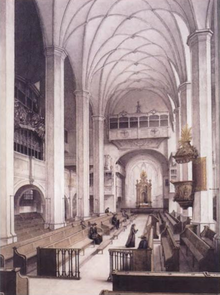BWV 135
|
Ach Herr, mich armen Sünder BWV 135 |
|
|---|---|
| Chorale cantata by J. S. Bach | |

Thomaskirche, Leipzig
|
|
| Occasion | Third Sunday after Trinity |
| Performed | 25 June 1724: Leipzig |
| Movements | 6 |
| Cantata text | anonymous |
| Chorale | "Ach Herr, mich armen Sünder" by Cyriakus Schneegass |
| Vocal |
|
| Instrumental |
|
Ach Herr, mich armen Sünder (Ah Lord, poor sinner that I am),BWV 135, is a church cantata by Johann Sebastian Bach. He composed it in Leipzig for the third Sunday after Trinity and first performed it on 25 June 1724. It is the fourth chorale cantata from his second annual cycle, of chorale cantatas, based on the hymn by Cyriakus Schneegass.
Bach composed the cantata in Leipzig for the Third Sunday after Trinity as the fourth cantata of his second annual cycle of chorale cantatas and first performed it on 25 June 1724, after Christ unser Herr zum Jordan kam, BWV 7, on St. John's Day.
The prescribed readings for the Sunday were from the First Epistle of Peter, "Cast thy burden upon the Lord" (), and from the Gospel of Luke, the parable of the Lost Sheep and the parable of the Lost Coin (). The cantata is based entirely on the chorale "Ach Herr, mich armen Sünder" (1597) by Cyriakus Schneegass, a paraphrase on Psalm 6 in six stanzas. The connection to the readings is rather marginal, the Lord's comforting (movement 3) and destruction of the enemies (5) refer to the epistle, the joy about a repenting sinner, the theme of the chorale, to the gospel. The unknown poet kept the first and last stanza unchanged. He paraphrased the other four stanzas to four movements, alternating recitatives and arias.
...
Wikipedia
